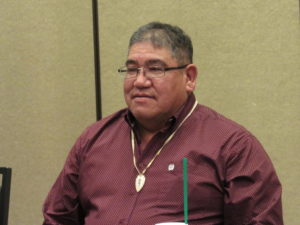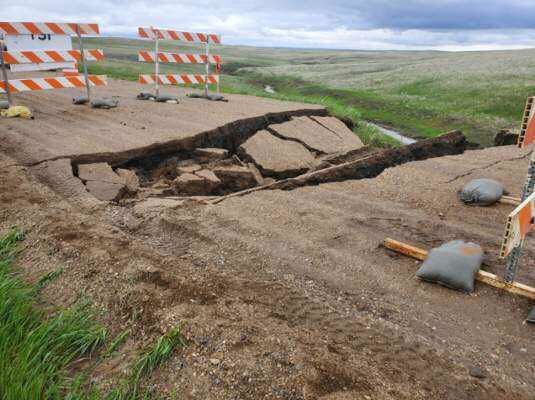
- Details
- By Native News Online Staff
EAGLE BUTTE, S.D. — Are toll booths coming to Indian reservations?
In recent years, more states have considered toll roads to raise repair funds. Now, one South Dakota tribe is considering this option for its reservation.
 Cheyenne River Sioux Tribe Chairman Harold Fraizer
Cheyenne River Sioux Tribe Chairman Harold Fraizer
Citing inaction on the part of the federal government to adequately provide financial aid to repair roads on its reservation, Cheyenne River Sioux Tribe Chairman Harold Frazier is in discussions to begin a feasibility study to determine if the Tribe should set up toll booths at state and federal highways that run through the reservation. Currently, there are no toll roads in South Dakota.
The Cheyenne River Indian Reservation experienced severe road damage last spring due to excessive and prolonged flooding. Fraizer said damaged roads on reservations can add undue travel time for tribal citizens when traffic is diverted on the reservation.
“We need to take such action because of federal neglect in the infrastructure property they have initiated. I have been all over Indian Country and realize that the federal government is not interested in helping anyone so we have to do it ourselves,” Frazier said in a statement.
 BIA Route 8 on Cheyenne River Sioux Reservation is only
BIA Route 8 on Cheyenne River Sioux Reservation is only
one of several roads that have been severly damaged due to weather.
Photo courtesy Cheyenne River Sioux Tribe.
According to the Tribe, if the current weather trends continue the infrastructure will further degrade. Roads damaged that have not been repaired from previous flood damage are vulnerable to further erosion in rainy weather.
More Stories Like This
Native News Weekly (August 25, 2024): D.C. BriefsUS Presidents in Their Own Words Concerning American Indians
Oral History Project Announces 14th Stop in Portland, Oregon: NABS Continues to Gather Crucial Stories Across Indian Country
Native News Weekly (October 12, 2025): D.C. Briefs
IAIA Alum and Faculty Mentor Tommy Orange Wins MacArthur Fellowship
Help us tell the stories that could save Native languages and food traditions
At a critical moment for Indian Country, Native News Online is embarking on our most ambitious reporting project yet: "Cultivating Culture," a three-year investigation into two forces shaping Native community survival—food sovereignty and language revitalization.
The devastating impact of COVID-19 accelerated the loss of Native elders and with them, irreplaceable cultural knowledge. Yet across tribal communities, innovative leaders are fighting back, reclaiming traditional food systems and breathing new life into Native languages. These aren't just cultural preservation efforts—they're powerful pathways to community health, healing, and resilience.
Our dedicated reporting team will spend three years documenting these stories through on-the-ground reporting in 18 tribal communities, producing over 200 in-depth stories, 18 podcast episodes, and multimedia content that amplifies Indigenous voices. We'll show policymakers, funders, and allies how cultural restoration directly impacts physical and mental wellness while celebrating successful models of sovereignty and self-determination.
This isn't corporate media parachuting into Indian Country for a quick story. This is sustained, relationship-based journalism by Native reporters who understand these communities. It's "Warrior Journalism"—fearless reporting that serves the 5.5 million readers who depend on us for news that mainstream media often ignores.
We need your help right now. While we've secured partial funding, we're still $450,000 short of our three-year budget. Our immediate goal is $25,000 this month to keep this critical work moving forward—funding reporter salaries, travel to remote communities, photography, and the deep reporting these stories deserve.
Every dollar directly supports Indigenous journalists telling Indigenous stories. Whether it's $5 or $50, your contribution ensures these vital narratives of resilience, innovation, and hope don't disappear into silence.
 The stakes couldn't be higher. Native languages are being lost at an alarming rate. Food insecurity plagues many tribal communities. But solutions are emerging, and these stories need to be told.
The stakes couldn't be higher. Native languages are being lost at an alarming rate. Food insecurity plagues many tribal communities. But solutions are emerging, and these stories need to be told.
Support independent Native journalism. Fund the stories that matter.
Levi Rickert (Potawatomi), Editor & Publisher

